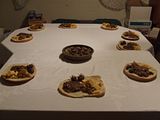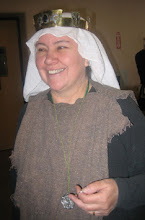"Our youth activities coordinators put on many, many educational activities these last few years, that are almost all period-related."
The SCA itself is one huge educational activity. Removing children from it has always seemed wrong to me, for many reasons.
"Almost all period-related" isn't good enough. "Period-related" isn't good enough. It's a violation of the purpose of the club, of the basis of the requirements for attendance. Furthermore, real children did things in period. They played games, played with toys. They didn't color worksheets. They watched puppet shows and sang songs. "Almost all period-related" is not good.
It's not about the officers. It's about the segregation by age, and the perpetration of the idea that learning happens in classroom-style settings.
"...asking our A&S teachers to let our youth know that they are welcome in their A&S classes."
Workshops should be provided, or run, or organized, but not "taught."
If there were no separate youth activities, the assumption would clearly be that participants of any age would be welcome to participate in anything other than holding certain offices, entering certain tournaments, and fighting if they weren't yet old enough. Unfortunately, this is not the case.
I bristle some at "our" being used of A&S teachers and of youth. To whom does someone belong, who chooses to demonstrate a skill or to impart knowledge? To whom do my children belong? Themselves, first. To Gunwaldt and to me, in a way. To the barony as residents and participants. To the kingdom as statistics, or when serving on a retinue, as Bardolf has. They don't belong to all adults in the kingdom.
It's true things aren't as they once were, and many things are worse. And it was not and is not inevitable. I warned that having children's activities and officers opened the SCA up to liability issues, when I was a corporate officer and the board was asked a couple of times to approve children's activities officers SCA-wide. It wasn't a good idea. It doesn't strengthen the Society, to treat it as a school.
Too many people see the world through school-colored glasses. The SCA was and should have continued to be a haven from that. There was a lawsuit in the 1980's brought by a former board member (whose lawyer friend wanted to have his name on a case). It was never tried, and part of the reason it was given up on was I pointed out that the assertion that we would be more "educational" if people were sitting in desks taking notes was absurd and defeated the entire wonderful basis of the Society, which was learning by preparing for and putting on and attending and participating in feasts and tournaments.
Do I keep quiet just because my own children are grown? I didn't even plan to have children when I first objected.
Do I roll over and die? Someday I will, but I haven't yet.
Urgent care for my Uvula
-
These were taken where I spent much of Christmas Eve morning. I love that
place, on Montgomery east of Juan Tabo, in Albuquerque. I took the photos
for the...













